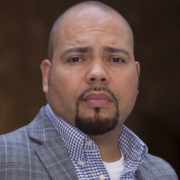Mark Paige & Bruce Meredith
A Right to Education? Realistic Paths to Achieve Equality
It takes about 15 minutes to drive from Edgewood to Alamo Heights in San Antonio, Texas. Yet the schools in each neighborhood are worlds apart. The student body at Alamo is roughly 52 percent white and 40 percent Hispanic. Only about 20 percent of students are classified as economically disadvantaged. At Edgewood, less than 1 percent of students are white and 97 percent are Hispanic. Nearly 95 percent of students are considered economically disadvantaged.
Over 50 years ago, similar school disparities promoted parents in Edgewood to file a court case seeking equality in educational financing. The case would work its way up to the Supreme Court in what is known as San Antonia Independent School District v. Rodriguez.
Considered one of the worst Supreme Court rulings since 1960, Rodriquez has withstood various challenges over the years. My guests today, Mark Paige and Bruce Meredith, argue it’s time to find new paths to create educational equality.
Mark Paige is a professor of public policy at the University of Massachusetts-Dartmouth and Bruce Meredith is the former General Counsel to the National Education Association Wisconsin Affiliate. Their article “Reversing Rodriquez: A siren call to a dangerous shoal” will be published in the University of Houston Law Review later this year.
Citation: Paige, Mark & Meredith, Bruce, interview with Will Brehm, FreshEd, 205, podcast audio, July 6, 2020. https://freshedpodcast.com/markpaige-brucemeredith/
Will Brehm 2:55
Mark Paige and Bruce Meredith, welcome to FreshEd.
Mark Paige 2:57
It’s nice to be here. Thanks for having us, Will.
Bruce Meredith 2:59
Thank you. Nice to be here.
Will Brehm 3:01
So, I want to start with perhaps a seemingly obvious question but maybe a bit of a complicated question: do Americans have a constitutional right to education?
Mark Paige 3:13
So, the answer is, under the federal Constitution: no. The US Constitution does not have a specific provision for education as a right. And the Supreme Court has so far refused to articulate that right. In the Rodriguez case, which we discuss, suggests that there is some minimal guarantee to an education. And for many academics, that’s been sort of the pursuit, is to convince a court as to what that minimum is. Under the state constitutions, however, there are specific provisions, and that’s where a lot of the litigation has occurred up until recently.
Will Brehm 3:52
Hmm, interesting. And in this Rodriguez case, what was that case about? And what did the Supreme Court actually rule?
Mark Paige 4:02
So, Rodriguez is a case from 1973 and it was a five to four decision. And the majority rejected a broad-based challenge to wealth-based disparities in education, and concluding, in part that education was a state and local matter. And also, a portion of the case left open this question of -the court might revisit the question of whether there was some minimum, some sort of “floor” that was a guarantee under the Federal Constitution. But what has pestered academics and folks for years after is what exactly that minimum would look like? Rodriguez has been highly criticized by a lot of folks because it strikes most Americans I think, as antithetical to their way of thinking about education. That when you tell somebody you don’t have a constitutional right under the Federal Constitution to an education, it sort of sets people back on their heels, I think, because there’s an intuitive kind of belief that education is at a core of an American value. How could that not be embedded in the constitution? We have a constitutional right to an abortion; how can we not have a constitutional right to education under the Federal Constitution? It strikes people as odd. And, you know, folks, I think, have spent a great deal of time struggling with that tension. And Rodriguez put that tension out. And that’s been the case of at least there’s got to be some minimum that Rodriguez guaranteed and that’s where the advocacy has been most recently, and where academics have been writing for years about what would that look like? If you could convince a court that there is a minimum?
Will Brehm 5:44
Okay, so the question is still outstanding. It’s not been answered, it sounds like. So, what sort of implications since 1973 has Rodriguez had on education, on legal opinions on education? What would happen to students and families who are -as you said, Mark, many people assume that they do have the constitutional federal right to education.
Bruce Meredith 6:09
Maybe I can answer that. For better or worse, it shifted education back to states and look for rights under state constitutions. As a result, there are substantial differences among states and across states on educational outcome. And there also is a huge achievement gap between wealthier Caucasian students and poor minority students. So, Congress tried fixing that with legislation called No Child Left Behind. And that imposed a very rigorous testing and sanctions regime. And the theory was, if you tested enough and sanctioned enough, the achievement gap would disappear and every child in America would become proficient in reading and math after a decade or so. The problem was, it did a wonderful job of showing the disparities in education. But it did almost nothing to actually change the results. The scores were pretty dismal at the beginning and pretty dismal at the end for certain districts, particularly poor districts and minority districts. So, eventually Congress overturn, repealed the legislation by almost the same widespread, bipartisan majority it did when adopting it. Now what we’re concerned with and why we talk about No Child Left Behind is one thing we worry about it if the courts were ever to give it back to Congress, we could have No Child Left Behind “the sequel”. And we think that probably would not be a very good approach. So, where we think a little differently is that we look at what are the various institutions for change, what are the best outcomes. And we think at this point in history, you’re better off looking for political change and concentrating more on state and local governments, in part, because state and local institutions tend to be somewhat less ideological than Congress. And they’re the ones who basically have to fund most of this. I mean, one of the huge problems with No Child Left Behind and a lot of federal initiatives is that they pass the law, say they’re going to fund it, but don’t and then leave the funding for the states, which then causes a lot of problems in the administration of the programs. We also think, as I say that right now, the courts are not particularly good institutions for solving this given their highly conservative nature. And also, we’re a bit worried that they’ll use this as an opportunity to basically go to a private system of education where vouchers and charters are the norm, not the exception.
Will Brehm 8:59
It’s an interesting dilemma. So, Rodriguez basically says that the federal government is pushing education down to the states. Maybe there’s some minimum, but that can be argued and debated what that actually looks like. But then the federal government turns around in the early 2000s, and says, here’s a No Child Left Behind policy that’s actually federally mandated. And then turns around and says to the states, but you have to pay for it, you have to figure out the financing. So, it just makes me wonder, has there actually been any attempts to get through the courts a federal or constitutional, fundamental right to education? Because it just seems like there’s such a big disconnect right now. Have there been any cases to actually try and push forward that fundamental right at the federal level?
Mark Paige 9:52
Yes, and most recently, there are two cases. One is Cook v. Raimondo and the other is Gary B. And to Bruce’s earlier point about connecting these cases back to your choice of social change, which institution do you choose to do that through? When you’re looking at either the political, there has to be some comparative analysis. So, you know, when we’re looking at the courts to perhaps pursue some constitutional right to education, then also the risks and the potential rewards have to be weighed in that equation against any other available institutions within -be it the marketplace, be it the political process- so, part of what we’re discussing, and I think these cases reflect is almost an impulse to think that the courts will give that remedy, that that will be the end result. Bruce and I were talking about the risk assessment and also against our other options of the political process. So, as we talk in the paper about, we think -later we’ll discuss the voting issue- may be the place to do that to get that maybe lower risk, a better reward. It’s not perfect by any stretch of the imagination. We’re not suggesting that Rodriguez was rightly decided or wrongly decided for that matter, but we are sort of, as Bruce alluded to, making a strategic suggestion. Having said that, advocacy groups have looked at federal courts most recently to argue that they’re to fill out that crumb that was left in Rodriguez about what “minimum education” might look like. One of those cases is in a federal district court in Rhode Island, and that’s Cook v. Raimando. That case suggests that the lack of a civics education in Rhode Island is the constitutional infirmity that there’s some obligation, a bare minimum, that would allow for an education to provide for some civics education. And the argument there is that students who are coming through, need knowledge about how their government works, the relationship between voting and power and all those sorts of things. And we don’t disagree with that. We agree with that general idea. One of the problems that we see with that case is that we think that Rodriguez spoke to that. In fact, one of the arguments addressed in Rodriguez was whether or not trying to link that fundamental right with the citizenship idea, and bootstrap that, if you will, into a larger constitutional right, connected to the other rights that we have under the Constitution. And so, there’s the Cook case. And as a practical matter, we wonder whether more civics education will lead to the remedy of more engaged citizens, especially given in the political context where we are now with gerrymandered congressional districts, with marginalized groups in terms of their political power, so without addressing the larger political, systemic problems, we’re wondering even if Cook found in favor of the plaintiffs, whether that remedy would actually give the things that we want. No Child Left Behind, for example, to go back, you know, mandated that kids are supposed to reach certain levels of proficiency with math and reading and so on. We’ve made some movement but that really hasn’t been happened. So, you know, there are other things going on out there that impact those sorts of outcomes. The other case that Bruce can talk about is Gary B. and that’s the case in Michigan, which was recently decided.
Will Brehm 13:46
So, what’s happening with Gary B., Bruce? Tell me, how does this connect to trying to, in a sense, overturn Rodriguez, and what’s your opinion of the political strategy with Gary B.?
Bruce Meredith 14:00
Well, Gary B. is an exceptionally interesting case. It’s become a bit of a mystery detective novel now. But it was a brilliantly conceived case. And to some degree, it achieved some small gains. What they did is they brought suit against the Detroit Public Schools and a number of other state actors. And as you know, Detroit, well, maybe Detroit is a heavily African American dominated School District. And what they plead in Gary B. was really dire facts. I mean, the schools were literally falling apart. They had pictures of rats running around the classrooms. There were virtually no books and very few of recent vintage. They didn’t have qualified teachers in many of the rooms, and some had no teachers at all. Now, because this was plead that way, you had to accept those facts as true until they were refuted either in a summary judgment, motion, or at a trial. But the defendants filed a motion to dismiss saying, “it doesn’t matter. There are still not any rights under Rodriguez.” And the District Court agreed with them. Then they appealed to the Sixth Circuit, which is a pretty conservative circuit. And in a two-to-one decision, the court said, “we’re going to look at this -what they call in Rodriguez, a- minimal quantum level of education”. And literacy certainly is important, and these schools aren’t meeting that minimal quantum. So, they rejected the motion to dismiss and said, “Go on, go to trial”. So, the district court bound for them and then they appeal to the Court of Appeals. So, after the Court of Appeals said two-to-one, try proving your minimal quantum, go forward. The plaintiffs sensing that things could go badly, further on immediately settled the case with the Democratic governor of Michigan. And they got some minimal benefit. And whatever happened was then being ratified, additional funds were coming, but then the Sixth Circuit on his own motion, without any prompting, reviewed the case, and basically reversed the decision of the Sixth Circuit panel. So, then it looked like the case was gone. Then mysteriously, again, largely on their own motion, the Sixth Circuit came back and said, “We’ll approve the settlement agreement. The case has now moot, but we’re vacating the original panel’s order”. So, they got some minimal relief but basically, they had a case that really couldn’t be cited for very much.
Will Brehm 16:53
Right. So, it couldn’t actually fundamentally challenge Rodriguez since it was moot?
Bruce Meredith 16:57
Right. So, one of the reasons we are sitting there why was this case so mysterious? Why did it take so many contours? And we speculate there might have been two reasons. First, if you really look at what’s going on, basically everyone understands that nothing like this would ever happen in a school district that was primarily Caucasian. So, you say, why didn’t the plaintiffs file a racial discrimination case? Well, they sort of hinted at it, but they never directly made that because our current Supreme Court has made it very hard to prove racial discrimination. So, one of the things that was happening in this case, there was almost an elephant in the room that no one really wanted to talk about. This case was very significantly, we think, about race and segregation, but that never was directly at play. The other kind of theory that was hinted at but wasn’t plead was that there was a liberty interested at stake. That essentially, they were arguing that these really weren’t schools, but kids had to go to them under the truancy requirements. So, in some ways, this was sort of like almost a type of prison life for these kids. They would be fined if they didn’t go to these schools, but in these schools, they had to endure these horrible conditions. And I think that would have been an interesting theory. Those are hard theories to prove. But one thing we were particularly worried about that theory is that one way you can resolve the whole liberty issue is simply give kids a voucher and say, like they sort of have done in New Orleans. Just go to any school you want and therefore it’s no longer the federal government’s problem, you’re choosing. So, that could lead to a particularly uninviting outcome, if you believe in public schools.
Mark Paige 18:46
And I think, if I may add to that, too, to highlight and underscore the risks involved with a court driven strategy is that you have the potential for a remedy of a voucher, of lifting charter caps, all the things that drift public schools towards privatization even though charters would be public in the sense, but we’ve highlighted -so, I think that it’s almost to be careful what you wish for because potentially, things could be reversed, where plaintiffs might suggest that their fundamental right is being violated because there aren’t access, as Bruce was alluding, to schools. But remedy might be in the form of a voucher, so now I can go to whatever school I want. I don’t have to be institutionalized in a rat-infested school. So, I think, in some ways that that case can highlight the potential risk, and in a way, the Sixth Circuit almost did a favor by dropping the case because had this gone to the Supreme Court, I think that probably they wouldn’t have in my view, you know, found a right. And then you’ve sort of backed up Rodriguez any chance of failing that for another 40 or 50 years. And I think, I don’t know this for sure, but I think the case was plead when everyone thought it would be President Hillary Clinton, who could appoint two other supreme court justices. And that didn’t happen. And I think that further underscores our suggestion that the political institutions are the places where, if you want certain remedies that enhancing public schools, the better remedy is the political and the higher risk one would be the courts.
Will Brehm 20:34
Interesting. So, before we turn to some of these political strategies and remedies -Bruce, you were talking a little bit about how vouchers could sort of overcome this issue of liberty. But what about the issue of segregation? I mean, if Gary B. brought up that theory of, these are highly segregated schools, how is that legally allowed?
Bruce Meredith 20:56
So, there’s been a lot of discussion on this. There’s a professor at Harvard Barbara Mundell, who has written a lot about it. And essentially, the way the conservatives view education is it’s not really a public good. It’s more of a private good. And so, what happens is when you basically allow people to choose, they choose in ways that are consistent with their biases and prejudices, which is they want to go to schools for a specific reason, often where children look like themselves, and often where they feel they can get a leg up on other kids. And so, there’s a real tendency, and I think this has been demonstrated, that once you start doing this – America’s schools really never desegregated after Brown. There was only some modest integration. But now, even that modest amount could be lost.
Will Brehm 21:51
And is school financing. You know, how public schools in America are funded primarily by local property taxes. Is that connected to the segregation we see as well?
Mark Paige 22:06
Yes. You know, the bulk of a school budget comes from local property taxes. Where you have more wealthier communities, they can levy a lower tax and get more money to fund their schools. In most cases, if not all cases, they are exceeding -the schools that they have are sort of the gold standard. And they also are affluent and sort of a proxy for that is they’re segregated as well. So, the race and class issue intersect that poorer school districts have lower property values, and also higher populations of minority populations. So, they do feed into each other. It does, so yes.
Bruce Meredith 22:54
So, most states have some system to try equalizing between rich and poor districts. Unfortunately, it’s usually not enough. And the other problem is that poor districts often have harder to educate students, students who don’t know English, different proficiency levels, and so it’s really very hard for those districts to catch up unless you radically change the state funding systems. And some states have required more radical funding, others have not. But it’s very challenging under most state systems, if you have a segregated district, a poor district, or a district with a lot of English learners to actually compete with a wealthy, Caucasian school district, and so parents seek out those types of school district because they feel their kid will get an advantage.
Mark Paige 23:57
And to add to that as well. I mean, even the wealthy districts -even in states where there’s been some sort of attempt to kind of level the playing field, if you will- the wealthier communities will never really let that happen. They will always be able to raise more, and they frequently do. And their amount per child is going to exceed generally, no matter what the state governments do to sort of try to compensate for that. As a general rule, those wealthier districts are spending more on kids that probably need less money to educate. So, the property tax function is highly problematic in terms of trying to deal with racial and class inequality. And that is sort of a fundamental problem.
Will Brehm 24:46
Yeah. And it seems as if you know, when you think about those disparities in funding, and how that intersects with class and race, you can understand why people would want to try and go through the courts to make changes. Because this seems so inequal. And it seems like it would be a violation of different constitutional rights that Americans have. But you’re sort of making this argument that the sort of environment in which we live in today, it might be better to take sort of non-court strategies or political strategies. So, what would some of those political strategies look like?
Mark Paige 25:22
So, I think, just to add to that, there is a history of state constitutional litigation. What you’ve just described has been attempted and pretty successful. I mean, I think two thirds of something like that have been successful plaintiffs arguing that the state finance formulas are unconstitutional, but under a state constitution and under those state constitutions that have a specific reference to education. So, that has been tried with some degree of success. At the same time, we still have massive inequality. So, it does kind of leave you with your head scratching about a court as a remedy, and people continually go back. This is one inefficiency of seeking remedy through the courts is that people have to go back and dog the state legislature about whether or not they’re meeting what they were supposed to meet under court orders. And that just drifts on and on. And courts don’t want to be involved with dealing with running a school district or a school system. They don’t have the capacity or feel like it’s their territory under the constitutional separation of powers to sort of start allocating money. That’s the legislature’s job. So, part of the political solutions and again, we don’t suggest this is the “magic potion”, this is going to solve everything. We do think in a question of finite resources and advocacy that the voting rights issue is probably more productive in terms of trying to get political actors to react to your policy demands, your policy changes. You know, politicians, they want to be reelected. They want the perks, whatever motivates that, and they do respond to voters, but they have to be a constituency that’s voting and able to vote. And so, what has happened is over time, voter rights, and there’s a massive voter suppression effort here in the states. But there are ways to kind of combat that and those are the things that we think might get the best lower risk and higher reward in terms of trying to change, not just schools, but all the things that impact educational achievement. We know that schools alone can’t solve health problems, and health issues, and all of the other social things that are related. But through a political solution, there’s a better chance to get at those other things.
Bruce Meredith 27:52
The Voting Rights Act does provide strong support that if you increase the voter turnout, particularly among disadvantaged populations, you increase funding. There is a lot of studies that, after the voter rights act was passed, African American schools got more money, fire stations were moved, social services were increased. So, there is a lot of research showing that if you change who votes, you change who gets the money.
Will Brehm 28:27
Hmm. So basically, you’re making an argument saying if we want to create some sort of equality in education, that many people see Rodriguez as you know, taking away in a sense. A politically savvy way of doing so would be to increase voter turnout. To get more people voting, get larger groups of constituents voting in elections at all levels, I would imagine -is that right? Like from federal, to state, to local, to school board and by doing that, you’d elect people that would then have to actually meet the demands and needs of their constituents who put them in office? That’s sort of the argument you’re making, is that right?
Mark Paige 29:09
Yes. And don’t take our word for it. You could take Mitch McConnell’s word for it because he’s someone who’s trying to make sure that the Voting Rights Act doesn’t get amended to have more teeth into it. One of the things that the Supreme Court did was try to strip away an important provision of the Voting Rights Act. And what Congress could do is amend -the court didn’t say strike the whole law down. You still can’t suppress the vote based on race, but they did strike out a provision that took away oversight over states and locals that might be doing bad things about voting. But what that would require would be a congressional amendment as opposed to an entire Supreme Court flip on a decision with Rodriguez. So, the court -and when they attacked the Voting Rights Act didn’t say, unlike Rodriguez, where they said there’s no fundamental right to education, the Voting Rights Act is a slightly different beast, because they said, well, if Congress amends it to the way we think it should be, then it’s okay. So, it left an opening. And the court also said, look at we think states can handle this, and they can actually start making amendments in their own jurisdiction. And we think that the voting issue is probably closer to the American psyche of democracy than education. And so, it’s probably more politically palatable, even though we’re struggling, as you’re alluding to, Will -the natural impulse, I think, is to go to the courthouse when the court says, “No, you don’t have an educational, right”. Everybody’s saying “How could that be? Well, let’s make sure that we have that educational right”, and so they pursue it through the courts. I think we’re tugging away a little bit from that impulse to try to say that the education problem might be better viewed as a voting political rights problem first. Again, the stipulation that it’s not perfect, it won’t solve everything. There’s just structural racism and injustice has to be dealt with, but this is, we think, the higher reward, lower risk.
Bruce Meredith 31:20
And another reason we focus on voting, particularly at the local and state level is often that’s where the action is. That’s where the mill rate is set. That’s where the boundaries are drawn. That’s often where the money is. So, the federal government provides a relatively paltry amount about 10% of education funding. So, there’s going to be a disconnect between winning a right at the federal level and enforcing it at the state and local level because the federal government is not the main player in terms of funding. So, that’s another reason why we energizing local communities can be very powerful.
Will Brehm 32:02
And are there any initiatives that are happening now around America, at the local level, at the state level, that make you hopeful? When you think of the federal level and how part of the Voting Rights Act has been overturned, and how there’s been so much discussion, it seems like over either, this notion of voter fraud, which might be totally made up, but also this idea that people are being dissuaded from going to the polls for all sorts of reasons. And that’s a federal issue, but at the local level, is there anything happening that sort of makes you hopeful for, I guess November is the next election cycle.
Bruce Meredith 32:41
Well, a number of states have adopted provisions to reduce gerrymandering on their own accord. Also, if you poll American people, they believe everyone should get a right to vote. It’s a popular concept, but it’s not one that gets enacted because it’s now become a partisan concept. And why we’re particularly worried about November, and also worried about schools, is because of the COVID-19 virus. I mean, you’re seeing what’s going on in the polling places on just the mechanics of voting. There’s not enough -the post office has been ravaged by the virus and isn’t operating that efficiently. Local poll officials are afraid they’re going to get sick and aren’t showing up. And now you have the huge problem of the states, and the local governments are completely broke. Congress has provided money to some businesses, to some people, but they haven’t given hardly any money to local units of government. So, what’s going to happen is, if you try improving education at this point, local units of government are going to say, where’s the money? Our tax base is being completely undermined. So, now is a particularly precarious time both for voting and funding of schools. And if you really want to see more equality in education, the first thing, the most important thing Congress could do is provide relief to the local school districts and local units of government so they can actually provide services. And once they do that, then they might move the next step of actually paying for all the mandates they require the local units of government to make. So, it seems to us kind of incongruent to be asking for a federal remedy when the federal government has shown almost a complete unwillingness to date to actually pay for what it wants.
Mark Paige 34:41
Well, to the question of, are we hopeful, what are we seeing on the voting rights point, I think there’s so much allegations of … on the hopeful side, you’re seeing more states I think do bipartisan commissions about how they’re going to approach voting and mail-in voting. And I think that’s good. And I think that’s because that voting issue -it is partisan, it is political, obviously- but it strikes to the heart of more people as democrats, “little d’s” democrats, you know, citizens. So, I think they’re it’s a more saleable argument to say we need mail-in voting, especially now, as Bruce was talking about the COVID-19 just makes that important. So, I’m hopeful and I think to underscore our emphasis on the political process as being part of this solution is, you’re seeing so much resistance to opening the ballot box by politicians, by certain ones, that it should give you a suggestion of how valuable they think that tool is to change the status quo. There’s something to be said about that, in terms of the power of that vote and what it means to shake things up. And political behavior tells us a little bit about that.
Will Brehm 35:55
Well, Mark Paige and Bruce Meredith, thank you so much for joining FreshEd. November is going to be quite the election, isn’t it? So, thanks again. Thank you very much for joining.
Mark Paige 36:03
Thanks for having us, Will.
Bruce Meredith 36:04
Will, I appreciate having us on this show. I think it’s a very important topic and I’m glad you thought it was important enough for the podcast.
Want to help translate this show? Please contact info@freshedpodcast.com
Related Author Projects/Publications
Reversing Rodriquez: A siren to a dangerous shoal
Mentioned Resources
San Antonio Independent School District v. Rodriguez
Education is still (for now) not a fundamental right under the U.S. constitution
Constitutional requirements governing American education
Cook v. Raimondo – Rhode Island
Educational gerrymandering: Money, motives and constitutional rights
Title VI – Proving discrimination-intentional discrimination
Gary Orfield’s work on school segregation
The learning Landscape: US School finance
State and local financing of public schools
The property tax-school funding dilemma
Prioritizing equity in school funding
How the Voter Rights Act came to be and how it’s changed
Will Mitch McConnell continue to block restoration of the Voting Rights Act?
Voting rights equal economic progress
Fighting gerrymandering in the states
Related Resources
Effects of federal education mandates
San Antonio Independent School District v. Rodriquez and its aftermath
Erasing race, dismissing class: San Antonio Independent School District v. Rodriquez
The enduring legacy of “Rodriguez”
Opposing views: The divide in public education funding-property tax revenue
Rodriguez revisited: Federalism, meaningful access, and the right to adequate education
Equal protection doctrinal evolution and implications on school segregation today
Why a ‘constitutional right to education’ won’t mean much
Redrawing school district lines
SCOTUS sets high bar for those bringing race discrimination cases
School funding in New Jersey: A fair future for all
Redistricting systems: 50-state overview
Multimedia Resources
The dilemma of public school funding – Lizeth Ramirez
School funding: The devil’s in the details
How Black high school students are hurt by modern day segregation
How these Black students fought modern-day segregation
Have any useful resources related to this show? Please send them to info@freshedpodcast.com









